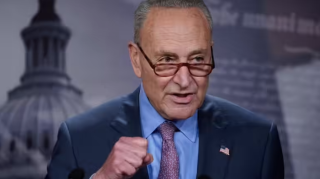Sen. Chuck Schumer's stature and power has grown with the majority leader title that now precedes his name.
But he hasn't forgotten the communities that brought him to that place, including those on Long Island, and the ones that depend upon him for resources. The state and the region are better off with him in the U.S. Senate's leadership, currently as majority leader and before that minority leader.
It's that mix, combined with a dynamic and engaged presence even after more than four decades in Washington, that has helped Schumer, 71, mostly successfully navigate the choppy waters of a divided U.S. Senate, while always looking for ways to get more for his home state.
It hasn't been easy, but the wins have been significant, including COVID-19 relief amounting to $10.5 billion for Long Island small businesses and nonprofits and more than $15 billion for public transit, funds for theaters and municipalities, and significant dollars for infrastructure, technology, and the environment.
Schumer's leadership is in part responsible for a milestone for New York this year: The state finally got more than it gave to the nation's capital — $1.59 came back to the state for every $1 that headed to Washington. That's partially because of the additional funds related to COVID that Schumer as majority leader was able to secure for state and local coffers.
Perhaps one of the biggest recent victories Schumer can claim is the siting of the world's first electron-ion collider at Brookhaven National Laboratory. That $2 billion project will have an extraordinary impact on Long Island and on the science itself, not to mention the jobs and economic benefits it will produce.
Also key to the state's economic future: the CHIPS and Science Act that Schumer championed, which led to Micron Technology Inc.'s plan to invest up to $100 billion on a semiconductor manufacturing campus upstate.
Schumer has been particularly important to the Metropolitan Transportation Authority, pushing forward and funding key projects, from the East Side Access connection to Grand Central Terminal to the East River Tunnels rehab. His role will remain particularly important on upcoming items like congestion pricing and Penn Station's remake.
Schumer's opponent is Yonkers Republican Joe Pinion, a former Newsmax television anchor who talks of building an "uncommon coalition" to focus on issues he said have long been ignored. Pinion, who turns 39 on Oct. 11, is right to highlight several enormous challenges, from crumbling and failing public schools to poverty. His passion is welcome, but he lacks concrete ideas on how to fix the problems he cites, and the skills needed to effectively serve New York in the U.S. Senate.
Schumer still has much to do, and is capable of getting it done, thanks to his flexibility and the relationships he has built. He pledges to hold a vote on the Respect for Marriage Act after the election, likely during the lame-duck session. That's important to codify legal recognition of same-sex marriages. But he's also looking to January, when he hopes Democrats will have more seats in the Senate and retain control of the House. If that happens, Schumer told the editorial board, there would be a lot on the table, including getting done critical but unfinished elements of the Build Back Better and Inflation Reduction Act efforts, such as funding early child care and universal pre-K.
If Schumer doesn't get the political edge he's hoping for, he'll have to find a way forward through often-rocky bipartisan terrain. He rightly notes the importance of the Senate's power to confirm judges at all levels; there are about 40 to be confirmed during the upcoming lame duck session.
But he also says there are items he can get done even in a complicated political landscape. Among them: comprehensive immigration reform, which Schumer hopes could be similar to the 2013 bill he and the late Sen. John McCain authored, with a path to citizenship for the nation's 11 million immigrants here illegally, additional border patrols, and more. Schumer is right to try to line up the support of key business leaders, who need workers and should recognize immigration's contribution to a healthy, growing economy.
Also crucial: the restoration of the state and local tax deduction, a promise he hasn't delivered on yet. Whether it's left to expire in 2025, or there's a way to unravel it sooner, SALT must continue to be at the top of Schumer's list.
Schumer rightly worries about the future of democracy. But his response to the issue is telling: "One of the best things that we can do is show people that it works for them."
Schumer notes that his father, who passed away last year, left him with two key lessons — to always help those who need help and to "persist and persist and persist" when you know you're doing the right thing. If Schumer can continue to uphold those values, while keeping New York, and especially Long Island, at the top of his mind, there's still much for him to accomplish.
Newsday endorses Schumer.

